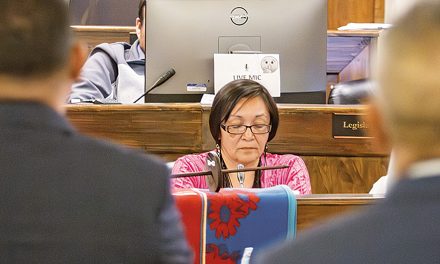
‘Almost in ruins’: Limited access to COVID-19 relief, PPE leaves businesses struggling
WINDOW ROCK
Lack of credit history, poor documentation and onerous application requirements are leaving small Navajo-owned businesses out of COVID-19 aid, U.S. Sen. Tom Udall, D-N.M., learned during a Dineh Chamber of Commerce conference call last Friday.
The vice chairman of the Senate Committee on Indian Affairs had asked to hear directly from Navajo small business owners as to how COVID-19 has impacted operations.
“This is a really tough time for businesses,” said Udall. “I hear it every day as I talk to tribal leaders.”
Udall said that while the $2 trillion Coronavirus, Aid, Relief and Economic Security Act was the largest relief effort ever passed by Congress, including the Small Business Administration’s Paycheck Protection Program and Economic Injury Disaster Loans program, he is aware that getting that money “out the door and on the ground” has been a challenge.
“I understand we didn’t have the success in tribal areas that we thought it would,” said Udall.
‘Businesses are struggling’
The economic impacts of COVID-19 on Native American small businesses have been “particularly harsh,” according to a report by the National Center for American Indian Enterprise Development and the Center for Indian Country Development that surveyed 400 Native-owned businesses in July.
As a public service, the Navajo Times is making all coverage of the coronavirus pandemic fully available on its website. Please support the Times by subscribing.
How to protect yourself and others.
Why masks work. Which masks are best.
Resources for coronavirus assistance
Sixty-eight percent of businesses surveyed experienced at least a 20% drop in revenues, while 16% reported zero revenues since the pandemic hit.
Forty-one percent of respondents said they had to lay off or furlough employees.
While some Native businesses avoided layoffs, only 22% of respondents qualified for the Paycheck Protection Program and lacked access to loans from credit sources.
Only 20% of respondents said they have enough cash on hand to sustain their businesses for another three months.
“The results make it clear that many of our businesses are struggling,” stated NCAIED President/CEO Chris James. “The survey is another indicator that we are not yet out of the woods and Native-owned businesses still need support and assistance to continue to serve their communities and create jobs.”
Lack of credit, financial records
On the Navajo Nation, many small business owners are suffering too.
A June 16 Navajo Division of Economic Development survey reported that out of 116 registered Navajo businesses that employ a total of 4,140 employees, only two received EID loans and 18 received assistance through the PPP, which included several larger tribal enterprises.
Derrick Watchman, president of Sagebrush Hill Group in Window Rock, said some of the feedback he has gotten from Navajo businesses was that they were at the bottom of the list for the PPP because banks gave preference to businesses that had existing lending relationships with them.
“One of the challenges that we heard is that it’s really hard to onboard a new credit customer, so if you don’t have a bank loan, you’re kind of at the bottom of the list,” said Watchman.
Many smaller businesses also couldn’t fulfill the detailed requests for information lenders want to see, he added.
“Basically, you had to have a bona fide financial reporting system,” said Watchman. “With limited financial documents, a lot of businesses weren’t able to get the paperwork together to qualify for a loan. Unfortunately, that left out many of our local, Navajo businesses.”
DED business, artisan relief
On Navajo, the Division of Economic Development was given $54.5 million to administer the Navajo CARES Business and Artisans Grant Relief Program.
However, on the current path it appears less than half of the money will have been distributed by the application deadline of Oct. 30, although DED Director JT Willie said that he’s hoping the deadline will be extended into November.
As of Oct. 16, there were 2,447 DED grant applicants with 1,090 approved for a total of $ 7.7 million in awards, which includes grants for 879 artisans ($4.3 million) and 211 businesses ($3.4 million).
There are 1,357 applications pending, estimated at $13.9 million if approved.
In order to qualify for the grants, businesses and individuals have to be registered under the Navajo Business Regulatory Business Source Listing.
Since the grant relief program began, there have been 3,912 new business certification applicants, for a total of 4,092 currently registered businesses.
This is good news for DED because prior to this effort there were only about 180 registered businesses on the Navajo Nation.
As with the PPP, Watchman said because of the burdensome reporting requirements for registering a business, the DED grant program has not able to do what it had hoped to do and left a lot of small businesses out.
“Many of our businesses are not benefiting from that money,” said Watchman. “What they constructed, in my opinion, was just too complicated. If it was approached differently, maybe the results would be different.”
Watchman believes that the stringent requirements for the grant relief program stem back to the Nation’s legal and financial teams whose focus on compliance and audit concerns drive their opinions and policies.
“At RDC (Resources and Development Committee), the delegates are concerned the funding is not moving as quickly as anticipated,” said Watchman. “There’s still a big need out there and the money’s not flowing fast enough. If they could come up with a simple process, that would certainly help.”
‘Mom and Pops’ left out
“Our greatest competitor is our own tribal government that owns the utilities, construction, arts and crafts, gaming, oil and gas companies and shopping centers,” said Dineh Chamber Board Chairman Jeff Begay.
“That’s the bulk of our private sector economy and we’re trying to get our leadership to understand they need to support mechanisms to help the Navajo small businesses,” he said. “We’re basically a cash economy. We have a lot of small mom and pop businesses.”
Many small businesses and sole proprietors lost out on relief programs because of the compliance requirements as well as lack of internet infrastructure and adequate communications systems, said Begay.
Additionally, $829,000 that was supposed to be offered to Navajo arts, crafts and food vendors as well as tour operators through the Parks and Recreation Department has been sitting idle, leaving some of the most vulnerable and enterprising Navajos without access to relief.
Begay lamented that Navajo leadership took four and a half months to appropriate the CARES Act monies.
“The $714 million dollars that has been appropriated through the CARES program may not all be spent,” he said. “There’s a lot of frustrated people out here and our small businesses are a major component of that.”
Watchman added that the Navajo Nation leadership has not reached out to small businesses and vendors in any meaningful way to check on them.
“We all acknowledge that our physical health is impacted, but don’t forget about the business health of our nation,” said Watchman. “It’s almost in ruins and almost at a point of no return. We do have a viable small business sector, but it’s fragile right now.”
‘It’s just killing us’
Executives Keith Graepler and Lauren Conklin of Diné Energy, a company formed in February that was poised to create jobs on Navajo, said as a new business, their company did not qualify for either federal or Navajo Nation COVID-19 financial assistance.
“We keep running into we’re not old enough to qualify,” said Graepler. “The fact that the newer businesses have been excluded from everything is pretty painful.”
Graepler said the short time frame to create infrastructure with the CARES Act funds has also hurt small business because contracts were awarded to larger companies that have a larger workforce.
“The funds that have been awarded to Navajo Nation have a very short timeline,” said Graepler. “It’s a large amount of money but being forced to spend it so fast is causing a lot of problems.”
Udall agreed and expressed confidence that an extension of the Dec. 30 tribal expenditure deadline is probable.
“We’re going to get that fix in there so that there’s a longer timeline to spend that money,” said Udall.
Vivian Tallbull, owner of Silver State Construction, Shiprock Subway and Nataanii Nez Inc., said that many of her companies’ processes had to be modified to accommodate COVID-19 protocols.
Additionally, Tallbull said with no support from the tribal government, businesses have had to buy their own personal protective equipment, which has significantly added to the cost of operation.
While Tallbull said she is grateful for the DED grant and PPP assistance, she believes it’s problematic that there is no Small Business Administration representation on the reservation.
“SBA should be on the Navajo Nation,” said Tallbull. “They did what they could, but we just got the leftovers on that.”
Penny Emerson, owner of Native Resource Development, who operates medical transport, home health care, janitorial and food service businesses and employees over 500 people, said that the cost of keeping employees safe with adequate PPE and sanitization supplies has been daunting.
“We are practicing strict COVID-19 protocols,” she said. “That additional expense has been tremendous.”
Abigail Yazzie, owner of Hodishooh Specialty Maintenance, has also been contending with a shortage of PPE. Her company has been cleaning and disinfecting buildings on the Navajo Nation during the pandemic.
“We cannot find any gloves right now,” she said. “We need these items.”
Yazzie added that the prices of PPE have also gone up dramatically.
“It’s just killing us,” she said.
Emerson said while she’s been able to retain all of her employees with the help of the PPP, she needs more assistance through another national COVID-19 relief bill.
“If Mitch McConnell won’t bring that to the table, we need to elect people that will,” said Emerson.
Udall expressed frustration that the additional aid in the $3 trillion HEROES Act has not been enacted upon yet while “Americans are dying, businesses are failing, people are out of work.”
“Republican leadership in the Senate has so far refused to work on that bill,” said Udall. “For five months they’ve done nothing. At this moment the Senate should be working around the clock to make sure Americans are safe and secure. I will continue to push for Congressional relief both on the health front and the economic crisis.”
‘Wake-up call’
Begay recommended to Udall that the next round of coronavirus relief offer grant and loan programs directly to Navajo small businesses, where they can apply for assistance without having to go through the tribal government.
Dineh Chamber Secretary/Treasurer Al Henderson said the Nation’s inability to spend the Navajo CARES Act funds in a more timely and efficient manner should be a “wake-up call” for Navajo decision-makers and leaders.
“Now they are in a pickle and they’re just going to divert the unspent money into the hardship arena, which is probably going to be spent in border towns,” he said.
Meanwhile, with critical infrastructure improvements such as water and electricity lines at risk for not being completed by the Dec. 30 deadline, there is no preparation for the future and everything remains the same, he said.
“Status quo is a comfortable arena that they’re operating in, which has been the ‘go-to’ situation for administration after administration,” said Henderson. “The status quo has put the Navajo Nation behind the eight ball every time.”








 Highway 264,
Highway 264, I-40, WB @ Winslow
I-40, WB @ Winslow